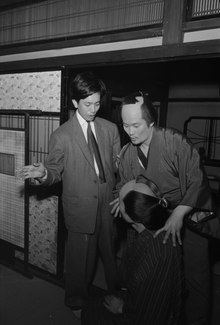Yūzō Kawashima | |
|---|---|
 Yūzō Kawashima | |
| Born | 4 February 1918 |
| Died | 11 June 1963 (aged 45) |
| Nationality | Japanese |
| Occupation(s) | Film director, screenwriter |
| Known for | Sun in the Last Days of the Shogunate |
Yūzō Kawashima (川島雄三, Kawashima Yūzō, 4 February 1918 – 11 June 1963) was a Japanese film director and screenwriter known for his lively comedies.[1][2]

Kawashima was born in Mutsu, Shimokita District, Aomori Prefecture.[2][3] After graduating from Meiji University's Department of Literature,[2] he entered the Shōchiku studios and served as an assistant director under Minoru Shibuya, Yasujirō Shimazu, Hiroshi Shimizu and others.[2][3] In 1944, he directed his first film, The Man Who Has Returned.[2] After the war, Kawashima made many comedies at Shōchiku,[2] but it was not before his move to Nikkatsu in 1955 that his work received critical acclaim.[1] At Nikkatsu, he directed such notable works as Burden of Love (1955), Suzaki Paradise: Red Light District (1956, Kawashima's own personal favourite of his films),[1] and Sun in the Last Days of the Shogunate (1957). In his remaining years, Kawashima worked at multiple studios—Daiei, Tokyo Eiga, and Toho—continuing to create satirical works like Temptation on Glamour Island (1959), Room for Let (1959), and The Graceful Brute (1962), as well as literary adaptations like Women Are Born Twice (1961) and The Temple of Wild Geese (1962).
Kawashima suffered from polio and was known as an excessive drinker.[2] He died in 1963 at the age of 45, having completed 50 films during a career which spanned only 19 years.[2]
Kawashima was a key influence on director Shōhei Imamura, who worked as his assistant director.[1]
In 1999, Sun in the Last Days of the Shogunate was voted the fifth best Japanese film of all time in Kinema Junpō's poll of 140 film critics and filmmakers.[4]